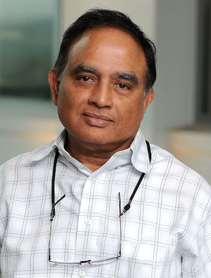
Dr. Chandra Sekhar Prayaga
- Position: Professor
- Department: Physics
- Office Location: Building 58, Room 005
- cprayaga@uwf.edu
- Campus: 850.474.2062
Biography
Dr. Chandra Prayaga, who has 35-plus years teaching experience, has helped raise more than $3 million in funding for research and projects involving UWF faculty and students. Prayaga, who joined UWF in 2002, has a Ph.D. in Physics from Indian Institute of Science in Bangalore. His Master’s in Physics was earned at Indian Institute of Technology in Delhi. He received a B.S. in Special Physics, Mathematics and Chemistry from Osmania University in Hyderabad, India.
Prayaga, who has taught a wide variety of graduate and undergraduate courses, also has been on the faculty of colleges in India and Alabama. He has been active with Teacher Institute for Physical Sciences, which won a Florida Department of Education grant to establish a web-based community of Physical Science teachers in middle and high schools. His research interests include optical and electronic properties of liquid crystals, liquid crystal devices that are of fundamental and technological importance, and robotics and computer simulations in physics education. Prayaga is co-author of a book, “Robotics: A Project-Based Approach,” published in 2014, and numerous articles in such publications as Journal of Computing Sciences in Colleges, Bulletin of the American Physical Society, Synthetic Metals, and Bulletin of Applied Computing and Information Technology.
Degrees & Institutions
Ph.D. Physics, Indian Institute of Science, Bangalore, India
M.S. Physics, Indian Institute of Technology, Delhi
B.S. Special Physics, Mathematics and Chemistry, Osmania University, Hyderabad, India
Research
My colleagues and I have created “Discovery Spot” a place for middle and high school students to go to explore STEM+C through exciting hands-on activities that we developed, which are rooted in researched teaching methods. We have done this in an effort to make STEM+C more accessible to the middle and high school community, and to study activities that encourage young students to not be afraid of Physics and educate parents what it means to be STEM ready for College.
We are also engaged in research on Liquid Crystals, materials which are fundamentally and technologically important. We measure properties of these materials at different temperatures, with particular interest near phase transitions. The measurement techniques developed are for Laser Induced Diffraction gratings, Dielectric and Optical properties. The properties of monolayer films are studied using a Langmuir trough. Samples and devices are fabricated using a bottom-up method either through spin-coating, thermal deposition, and/or Langmuir-Blodgettry. The material properties are explored by investigating the phase diagram of the 2D system at an air-water interface. Deposited samples and devices are characterized using XRD, dielectric/capacitance and transport measurements, and through optical spectroscopy and microscopy.
Current Courses
- University Physics I
- Electricity & Magnetism I
- Quantum Theory I
Classes Taught
- Quantum Theory I and II
- Thermodynamics
- Solid State Physics
- University Physics I and II
Publications
Prayaga is co-author of a book, “Robotics: A Project-Based Approach,” published in 2014, and numerous articles in such publications as Journal of Computing Sciences in Colleges, Bulletin of the American Physical Society, Synthetic Metals, and Bulletin of Applied Computing and Information Technology.
Keywords: optical and electronic properties of liquid crystals, fundamentally important liquid crystal devices, tele-robotics, computer simulations and robotics in physics education, novel liquid crystals, non-linear optical materials


